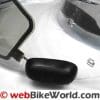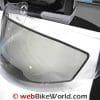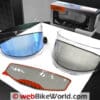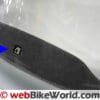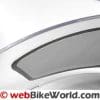Our 2008 Dealer Expo report included an article on a unique and interesting new product for motorcyclists: an electrochromic visor.
It wasn’t quite ready for retail at that time and after more development, it started shipping in August 2009, when it was introduced as the Gemini Tint-on-Demand Motorcycle Helmet Visor.
For some reason, it didn’t become as popular as originally envisioned.
But development work continued and a new version is now being introduced: the e-Tint MX-8 Liquid Crystal Visor, manufactured in Kent, Ohio by AlphaMicron, Inc.
That’s right — a product actually manufactured in the U.S.A.!
What Is It?
For the uninitiated, an electrochromic (or in this case, LCD) visor instantly changes tint from light to dark using an electric charge.
This is different from a photochromic visor, such as the SolFX Transitions visor (review) of 2009, which uses UV rays from the sun to slowly change from light to dark.
When you hit the switch on an electrochromic or LCD visor, it instantly changes from light to dark tint or vice-versa.
The technology was originally developed for the military by AlphaMicron, who has been making “instant tint” visors and products for some time.
For example, the e-Tint Liquid Crystal electrochromic system is used in ski goggles sold by AlphaMicron and now the technology is available in the e-Tint Liquid Crystal Visor insert for motorcycle helmets.
The e-Tint MX-8 has a few unique features. First, it is a visor insert, not a replacement face shield.
It looks very similar to the Pinlock anti-fog insert that has become so popular recently, which means it can be installed in just about every standard motorcycle helmet face shield. But the e-Tint insert fits any motorcycle helmet face shield without the “pins” of the Pinlock.
In addition, the e-Tint MX-8 includes anti-fog capability. In fact, it is anti-fog coated on both sides of the surface, not just the inside.
So the air and moisture that is always trapped between the insert and the polycarbonate face shield will not cause fogging, a problem on some of the competitor’s inserts.
The e-Tint MX-8 is very thin. I didn’t measure it; that will have to wait until the full webBikeWorld review, but I estimate it to be about 2 mm thick. UPDATE: AlphaMicron confirmed it is 10 mil thick (0.01″).
The MX-8 comes in two tints — blue or gray — and two versions. The standard version attaches to the inside of the face shield and it has a small battery pack that fits on the outside of the face shield and includes the on/off switch.
The battery pack assembly is attached with an automotive-type glue to hold it tight. The button is pressed to turn the tint on or off and the battery is rechargeable with an included USB cable.
e-Tint AX-9 Automatic Visor Insert
A new automatic version of the e-Tint Liquid Crystal Visor, the AX-9, has also been released. The battery and switch assembly are included as part of the insert itself on this version, contained in the perimeter of the insert inside the face shield.
The AX-9 e-Tint visor can be manually switched on and off like the MX-8 version, but it also has a light sensor that can automatically activate the tint.
When the rider moves from dark to light — for example, when coming out of a tunnel — the sensor will automatically switch the tint from light to dark. This is illustrated in the video below, using a small flashlight as the light source.
The AX-9 insert also has the anti-fog treated surfaces.
Installing the e-Tint Visor Insert
It’s not difficult to install either the e-Tint MX-8 or AX-9 on a face shield. First, a temporary plastic sheet template is placed over the outside of the face shield. This provides an outline used to locate the insert on the inside of the face shield.
Next, the plastic film is peeled from the face shield side of the MX-8 or AX-9 insert. The insert is then placed on the inside of the face shield, using the template as a guide.
Peel off the second piece of protective film on the inside of the MX-8, then attach the battery pack to the outside of the face shield and it’s ready to go.
The automatic version doesn’t need the battery pack on the outside because the battery is built into the insert border.
By the way, AlphaMicron will also be introducing an anti-fog only version of the insert, but with a twist: it can be removed from one face shield and inserted in another if desired.
We’re planning on a full review with more photos and video of the e-Tint Liquid Crystal Visor, so stay tuned. Meantime, here are some photos and a video.
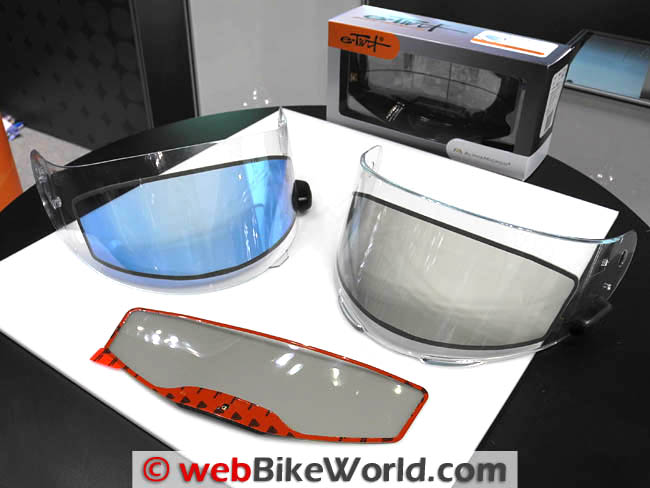
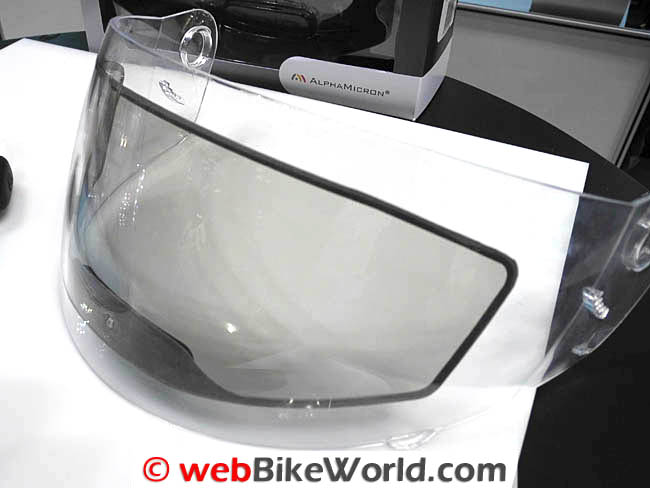
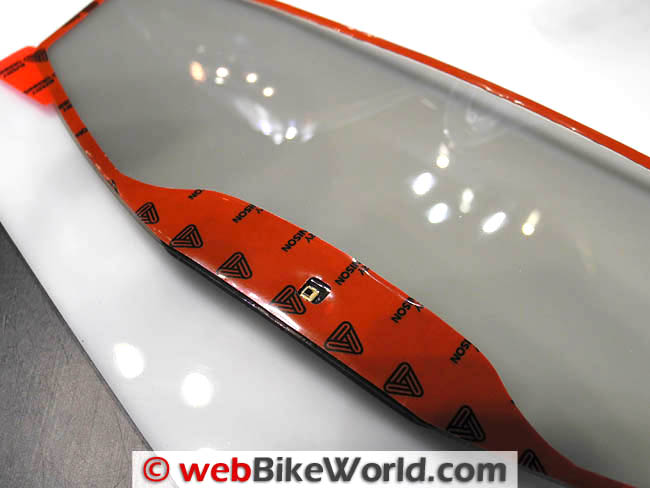
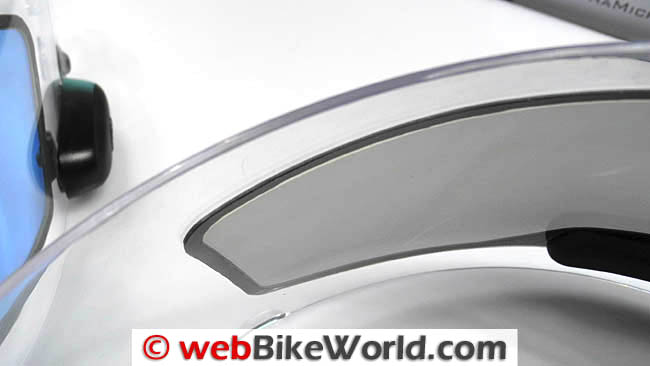
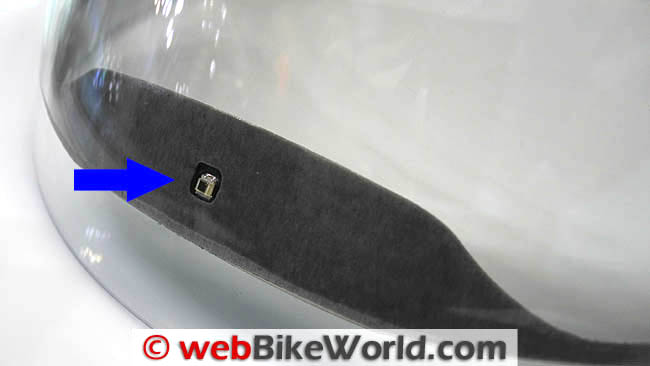
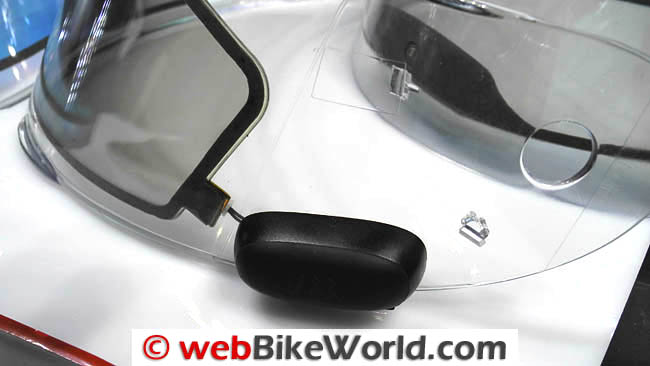
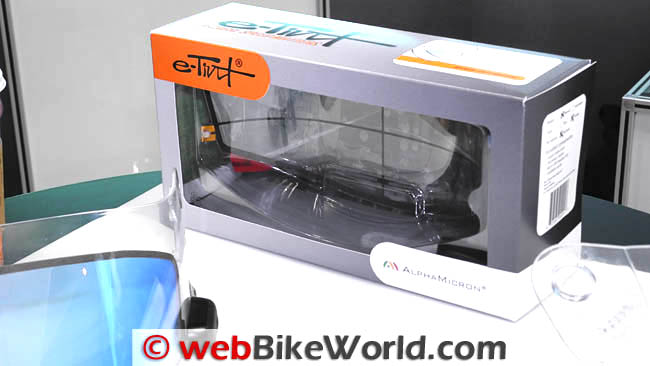
More webBikeWorld:
Publication Date: February 18, 2011


